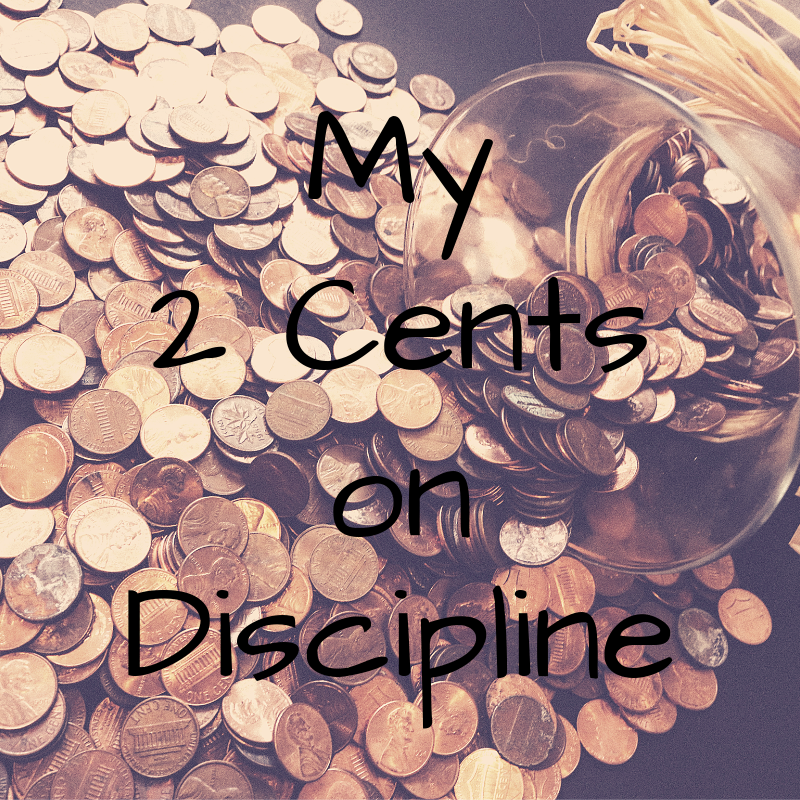|
These principles are based on a hodge podge of observing experienced parents, listening to/watching experts (Nanny 911 and Dr. Ray are my favorites), evaluating my mistakes as a parent for 2 years and teacher for 3 years and applying strategies from my classroom management classes. Cent 1: If it doesn't work for you, it won't work.I don't care how good the advice is, if you can't follow through with it, it's worthless. I learned quickly as a teacher that only enforcing discipline some of the time teaches kids to play lottery. The "will I get away with it this time" game is very fun for teenagers and very frustrating for those trying to keep their wits as a first year teacher or as a tired/stressed parent. This game can begin as soon as the child learns the word "no," so only pick discipline strategies that you can consistently follow through with. The more immediate the consequences have better outcomes, especially for younger children. The "especially for younger children" part can be misleading. I LOVE natural consequences, which is when the consequence makes sense based on the action. For example, if a kid puts gum on the bottom of the desk, they should scrape all the gum off of all the desks or if my potty-training toddler potties on the chair, she can't get sit on the chairs until she goes potty in the potty. These are good, but as a teacher I spent too much time trying to figure out the best consequence. The best consequence for an action does no good if it occurs too long after the behavior. I also had the problem of getting busy and forgetting that so-and-so still needed disciplined. Considering those factors, I now focus more on immediate consequences and consider it an added bonus if it's also a natural consequence. Little kids especially need immediate consequences because their brain isn't developed enough to connect the consequence to the action if they are too far separated. You must pick your battles. If you try to fix everything at once and have a perfect child, you will wear yourself out and not be able to consistently discipline. For example, Austin and I are working on helping Alexis stay quiet during quiet parts of church. One Sunday after church, I was thanking Austin for his consistency in taking her out when she needed it. He took that to mean that we needed to take her out for ALL misbehaviors (being loud, not sitting still, etc.), so the next Sunday he tried to get her to sit still and be quiet. He was exhausted by the first 10 minutes of church! We talked through our miscommunication and agreed that we can work on teaching Alexis the appropriate and inappropriate times to sing during church and work on other behaviors at a later time. I'm not an expert, but for sanity's sake, I say to work on a few age-appropriate goals instead of striving for a perfect child. Cent 2: Just keep going, going, goingIn order to pick discipline strategies that you can consistently follow through with, you should have an easy-to-use strategy for each situation. For example, my go-to discipline strategy with a 2-year old is standing in the corner. Have you ever tried to find a corner in a grocery store?!?!?! This is where alternatives come in handy. Many times the discipline will be changed to holding her hands together for the amount of time she would normally spend in the corner or having her stay in the cart instead of walking around. Adapt your discipline to your circumstances and go with it! Dr. Ray shares a story of taking his kids to the doctor. The kids sat on their chairs and read their books and caused zero problems. The office staff complimented him on how well-behaved his children were. He told the staff that they hadn't seen the thousands of other times when they misbehaved. He didn't have "good kids," his kids just knew the price to be paid by misbehaving and decided it wasn't worth it (that time). This story shows that discipline is an on-going process. Even after your child has "learned" not to touch great-grandma's candy dish, he or she will probably try to touch it again and you will need to discipline again. It may be weeks or months after they stopped. Instead of getting discouraged and frustrated, know that reverting is normal, discipline and move on. Don't worry about what other people think. There will be people who judge you for disciplining and people who will judge you for not disciplining. Pick your battles and be consistent. They don't know what stage of your parenting journey you are on. Some of my favorite discipline strategies to help you just keep going are:
You're human, so you'll make mistakes. Don't beat yourself over it, just resolve to do better next time and keep on going, going, going. Last ThoughtsAs a teacher, I learned through experienced co-workers that dealing with behavior immediately produces much better outcomes than later on in the year. You can always start over, making it clear that this is the new expectation and this is the consequence if you don't follow that expectation, but you will receive more resistance and testing than starting with the expectation and consequence on Day 1. For that reason, I never allowed Alexis to suck her thumb. Some people thought I was crazy, but for us it was super manageable. She didn't start until she was about 4 months old, so I would just pop it out of her mouth when she put it in. She didn't cry or anything, so it was way easier than trying to teach a 4 year old to stop sucking her thumb. Just because it worked great for Alexis doesn't mean it will be the same for the next baby. If it's easy to stop a bad habit before it starts, then why not? My grandma recently told me a story about getting a letter home from school about her youngest acting up. She had NEVER received a letter home from school, not even for my dad (her second and her notorious trouble-maker). He still suffers from a bad case of "middle-child syndrome." Anyway, she thought to herself "what am I doing differently?" and realized that the only difference was she started working. Between work and her other kids, she wasn't spending time with her youngest like she had with the older 3 at that age. She set aside time each night just to be with him--mostly to read to him, but sometimes do other things--and she said his discipline problems went away. If a child isn't receiving enough positive attention, they will seek attention any way they can find it. Some kids, like my dad, are adrenaline-seekers rather than attention-seekers. Considering that, just make sure you're spending quality time with your kid, but don't guilt yourself into thinking that their misbehavior is due to you not spending every available moment with them. I believe quality-time and independent play are equally important to a child's development (and a parent's sanity!) and that each child needs a healthy dose of both each day. I hope your take-away from this blog post is that you need to discipline in a way that is appropriate for your child and family situation. I am not a judgmental person: I don't care how you discipline or what behaviors you choose to discipline as long as you have in mind what is best for your child (abuse is never what is best for your child). However, you will make me cringe if I hear you threaten but not follow through or tell your child/teen no without any consequence for continuing the action. It's not that you're letting your child "get away" with "bad behavior" that bothers me, but by not following through, you are teaching your child they don't have to listen-a teacher (and parent)'s worst nightmare! On that note, I'm not a fan of counting because I believe it tells the child you don't have to listen to me immediately, you only have to listen by the time I count down from 3 or the 3rd time I ask. That being said, I won't judge if it is what works for you as long as you believe it is best for your child. Maybe the countdown is what you need keep from overreacting. If so, count away! What's your go-to discipline strategy? What mistakes have you made that you hope others can learn from?
1 Comment
|
Are you looking for a specific blog? Find it here!
AuthorStephanie started her Creighton Model journey in early 2014 and entered the program to instruct others in 2017. She enjoys equally adventuring in the great outdoors with family and friends and reading a good book with a cup of tea. For more details, visit her About Me page. Archives
March 2021
Categories
All
|


 RSS Feed
RSS Feed
